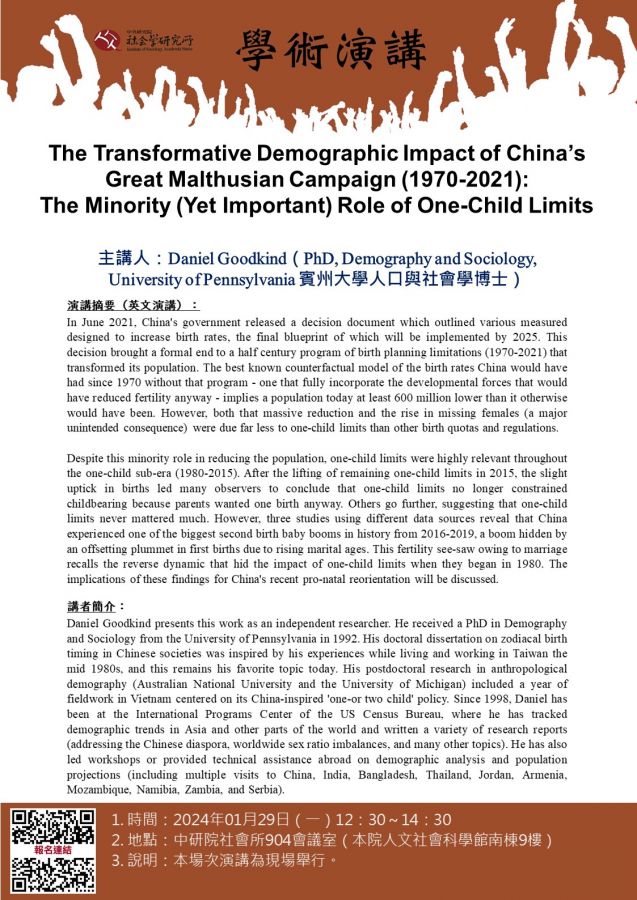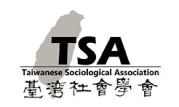中研院社會所1/29 Daniel Goodkind博士演講
2024-01-11
中研院社會所「中國效應研究」主題研究小組於2024年1月邀請Daniel Goodkind博士至本所演講,歡迎踴躍報名參加!
【講題】The Transformative Demographic Impact of China's Great Malthusian Campaign (1970-2021): The Minority (Yet Important) Role of One-Child Limits
【講者】Daniel Goodkind(美國賓州大學人口與社會學博士)
【主持】鄭雁馨(中央研究院社會學研究所研究員)
【時間】2024.01.29,12:30~14:30
【報名】https://forms.gle/oMac5MTxxryRw5qo9
【地點】中央研究院社會學研究所904會議室(人文社會科學館南棟9樓)
【活動聯絡】周先生 louischaowi@gmail.com
【演講簡介】
In June 2021, China's government released a decision document which outlined various measured designed to increase birth rates, the final blueprint of which will be implemented by 2025. This decision brought a formal end to a half century program of birth planning limitations (1970-2021) that transformed its population. The best known counterfactual model of the birth rates China would have had since 1970 without that program - one that fully incorporate the developmental forces that would have reduced fertility anyway - implies a population today at least 600 million lower than it otherwise would have been. However, both that massive reduction and the rise in missing females (a major unintended consequence) were due far less to one-child limits than other birth quotas and regulations.
Despite this minority role in reducing the population, one-child limits were highly relevant throughout the one-child sub-era (1980-2015). After the lifting of remaining one-child limits in 2015, the slight uptick in births led many observers to conclude that one-child limits no longer constrained childbearing because parents wanted one birth anyway. Others go further, suggesting that one-child limits never mattered much. However, three studies using different data sources reveal that China experienced one of the biggest second birth baby booms in history from 2016-2019, a boom hidden by an offsetting plummet in first births due to rising marital ages. This fertility see-saw owing to marriage recalls the reverse dynamic that hid the impact of one-child limits when they began in 1980. The implications of these findings for China's recent pro-natal reorientation will be discussed.
講者簡介:
Daniel Goodkind presents this work as an independent researcher. He received a PhD in Demography and Sociology from the University of Pennsylvania in 1992. His doctoral dissertation on zodiacal birth timing in Chinese societies was inspired by his experiences while living and working in Taiwan the mid 1980s, and this remains his favorite topic today. His postdoctoral research in anthropological demography (Australian National University and the University of Michigan) included a year of fieldwork in Vietnam centered on its China-inspired 'one-or two child' policy. Since 1998, Daniel has been at the International Programs Center of the US Census Bureau, where he has tracked demographic trends in Asia and other parts of the world and written a variety of research reports (addressing the Chinese diaspora, worldwide sex ratio imbalances, and many other topics). He has also led workshops or provided technical assistance abroad on demographic analysis and population projections (including multiple visits to China, India, Bangladesh, Thailand, Jordan, Armenia, Mozambique, Namibia, Zambia, and Serbia).
活動說明:本場次演講僅規劃現場參與形式,無線上參與形式。

【講題】The Transformative Demographic Impact of China's Great Malthusian Campaign (1970-2021): The Minority (Yet Important) Role of One-Child Limits
【講者】Daniel Goodkind(美國賓州大學人口與社會學博士)
【主持】鄭雁馨(中央研究院社會學研究所研究員)
【時間】2024.01.29,12:30~14:30
【報名】https://forms.gle/oMac5MTxxryRw5qo9
【地點】中央研究院社會學研究所904會議室(人文社會科學館南棟9樓)
【活動聯絡】周先生 louischaowi@gmail.com
【演講簡介】
In June 2021, China's government released a decision document which outlined various measured designed to increase birth rates, the final blueprint of which will be implemented by 2025. This decision brought a formal end to a half century program of birth planning limitations (1970-2021) that transformed its population. The best known counterfactual model of the birth rates China would have had since 1970 without that program - one that fully incorporate the developmental forces that would have reduced fertility anyway - implies a population today at least 600 million lower than it otherwise would have been. However, both that massive reduction and the rise in missing females (a major unintended consequence) were due far less to one-child limits than other birth quotas and regulations.
Despite this minority role in reducing the population, one-child limits were highly relevant throughout the one-child sub-era (1980-2015). After the lifting of remaining one-child limits in 2015, the slight uptick in births led many observers to conclude that one-child limits no longer constrained childbearing because parents wanted one birth anyway. Others go further, suggesting that one-child limits never mattered much. However, three studies using different data sources reveal that China experienced one of the biggest second birth baby booms in history from 2016-2019, a boom hidden by an offsetting plummet in first births due to rising marital ages. This fertility see-saw owing to marriage recalls the reverse dynamic that hid the impact of one-child limits when they began in 1980. The implications of these findings for China's recent pro-natal reorientation will be discussed.
講者簡介:
Daniel Goodkind presents this work as an independent researcher. He received a PhD in Demography and Sociology from the University of Pennsylvania in 1992. His doctoral dissertation on zodiacal birth timing in Chinese societies was inspired by his experiences while living and working in Taiwan the mid 1980s, and this remains his favorite topic today. His postdoctoral research in anthropological demography (Australian National University and the University of Michigan) included a year of fieldwork in Vietnam centered on its China-inspired 'one-or two child' policy. Since 1998, Daniel has been at the International Programs Center of the US Census Bureau, where he has tracked demographic trends in Asia and other parts of the world and written a variety of research reports (addressing the Chinese diaspora, worldwide sex ratio imbalances, and many other topics). He has also led workshops or provided technical assistance abroad on demographic analysis and population projections (including multiple visits to China, India, Bangladesh, Thailand, Jordan, Armenia, Mozambique, Namibia, Zambia, and Serbia).
活動說明:本場次演講僅規劃現場參與形式,無線上參與形式。




